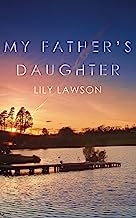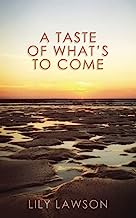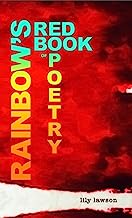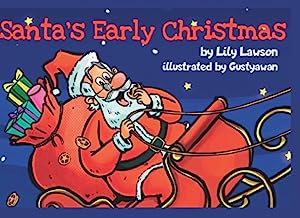I first met Lily through the Open University's Write Society and then we developed a closer working relationship when I was working on Makarelle and we published a lot of Lily's work. I have read and enjoyed several of her poetry books and it is primarily this aspect of her writing that I am familiar with. However, Lily and I have done guest posts for each other's blogs as well, so when she published a children's Christmas story, I was intrigued by the change of direction. I bought a copy and it has become part of my Christmas routine with my youngest son and I was pleased to see that she had plans to release more. There are now two more books to entertain children and I was delighted when Lily agreed to be interviewed and talk a bit more about her books.
We know you mostly as a poet. What made you decide to write a children’s book and how different was it to your usual style of writing?
My first children’s book Santa’s Early Christmas started out a poem for my Dad’s Christmas card. It was adapted for children.
The Palm Tree Swingers Island Band was adapted from a poem I wrote for a prompt.
If I Were Invisible .. was a poem I wrote for a prompt too.
I didn’t decide to write a children’s book at all. I just wrote poetry that ended up being suitable.
I used to write rhyming poetry all the time, I suppose I rhyme by default to an extent. I don’t rhyme so much now but it works well for children’s books. I have learnt that I need to take into consideration what images will go with the story and how many there will be. The fact I write these books accidentally may make that interesting.
How old were you when you realised you wanted to be writer and what made you decide to write for a purpose other than your own enjoyment?
I’ve been writing since I was 11. When I got brave enough to show people they thought my poetry was good. My teacher put a poem on the wall, and I thought maybe I can do this.
In my twenties my dad found me some opportunities in the newspaper, and I had poems published in obscure anthologies likely out of print now.
I joined Twitter for uni. After winning a prize of a poetry course in a writing comp I joined write club. I submitted some poetry and stories to write club anthologies and with a fair bit of encouragement from members and friends it sparked thoughts of publishing my own book.
What books influenced you as a child, as an adult and as a writer?
As a child I loved Enid Blyton’s Famous Five series, the sense of adventure and the sticking together no matter what appealed. The other book I think of fondly is Freaky Friday by Mary Rodgers. Maybe a little of the fantasy and ‘what if?’ we all need as writers started as a result of reading those books. As an adult I gobbled up Harry Potter. I was also a fan of Marian Keyes, Christina Jones, Kathleen Rowntree, Cecelia Ahern … I love reading and always have at least one book on the go.
I am still a fan of Mike Gayle, Danny Wallace, Maureen Lipman and Sandi Toksvig. The conversational style as if the author is talking personally to the reader is something I try and do in blogs, newsletters, and marketing generally.
The books of Julia Donaldson speak to me as a kid’s writer. The Gruffalo will stay with me a long time. As will Cops and Robbers by Allan and Janet Ahlberg. They appeal to me as a poet being rhyming books – in these cases with a refrain.
My current reads are often self-published books by the writers I’ve met on social media. They also recommend books on writing to me which appeals to me as an eternal student and lover of non-fiction.
Are there particular places/themes that particularly inspire your writing?
I write about people and the experiences we share as humans. I can be inspired by music, objects, the weather, animals, observing the world around me. I love writing for prompts and I never know where they will take me. Other people’s writing can sometimes be inspiring too.
Have you done any writing courses that you would recommend to people? Why were they helpful to you?
I’ve done a lot of courses (believe it or not!).
The one that stands out is FutureLearn’s ‘How to make a poem’. I learnt a lot from the community as well as the tutors. It’s part of their courses that you are encouraged to interact in the forum. Some of us formed a group for a while. I tried things I never would have if it wasn’t for those people. I will always be grateful for that. I think it made me a better poet.
What made you choose self-publishing over traditional? How have you found the experience?
By the time I published my first book in 2020 I had been part of the writing community on Twitter for over a year. I had met a lot of querying authors and seen how the process effected them. I also learned that if you are published by someone else you lose control of your book, they make the decisions including marketing. I find various situations uncomfortable, and I wanted to avoid them. I didn’t really know where to start trying to publish a poetry book traditionally. I didn’t know anyone that had. Through write club I met people who had self-published, and I decided to give it a go.
It has been challenging at times. I did my own covers for my first two books (now replaced with better versions by a friend who knows what they are doing). Uploading the books, particularly getting the covers the right size, nearly put me off. The writing community saved me again and now I upload the content my way. I am still rubbish at sizing covers my friends are still helping me there. I love that I’m in charge of it all. I would ideally like to do it all myself as I don’t like relying on others. With the kids’ books I haven’t got the skills to do the illustrations, but I hope to be able to be self-sufficient for the adult books eventually.
There is an ongoing debate in writing circles at the moment about sensitivity readers, cultural appropriation and diversity etc. What is your take on this? Should writers be allowed to write whatever they want, or should they be aware of changing attitudes/acceptability of language etc even if they are writing pieces set in the past?
It is tricky. We are expected to present the past in an authentic manner and can be criticised if we don’t. There is an expectation to write what we know but that can be limiting as writers and to take that literally would remove a wide range of literature from the shelves.
Sensitivity readers are important. There’s a difference to me in writing about something that reflects the history of your own culture (or could) and something you would have no understanding of. Research can ensure we are factually correct, but it can’t replace the experiences of belonging to another race, culture, or faith.
What is your personal favourite of your own work and why?
In short story terms - ‘Love Andy’ – I loved the idea of writing as a dog and dog owners saying I got it right meant a lot.
In poetry terms – ‘Love vs Hate’ – I feel I got the message across well.
In book terms – ‘My Father’s Daughter’ – your first book is always special.
I hope that I have grown as a writer. I recognise that it’s a process and if you were to ask again in the future my answers would likely change. They have from the last time I was asked.
What are your new books about and what age range are they aimed at?
The Palm Tree Swingers Island Band is a collection of animals that play music together.
If I Were Invisible … is about a boy who wonders what it would be like to be invisible, he imagines all the things he could do.
They are picture books so 3 to 6/8.
Lily Lawson is a poet, children’s and short story writer living in the UK. In addition to her books, she has published poetry, short stories, and creative non-fiction in anthologies and online.
Find out about Lily and read more of her work on her website: lilyswritinglife.com. Subscribers to her newsletter, Life with Lily, are the first to hear all her writing news.
Social Media Links:









Comments